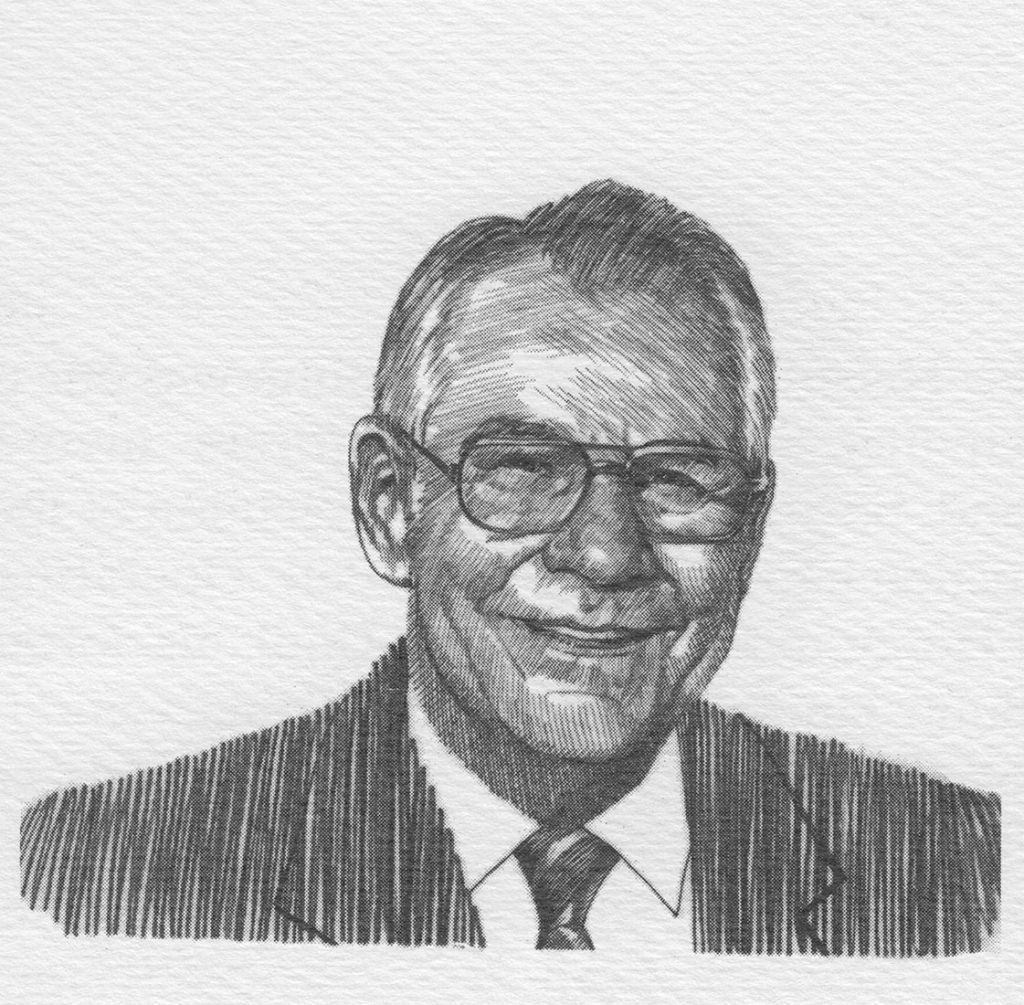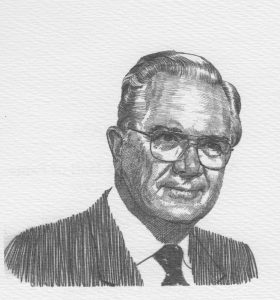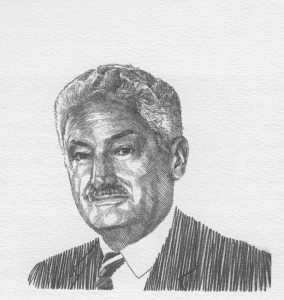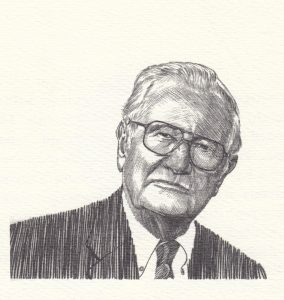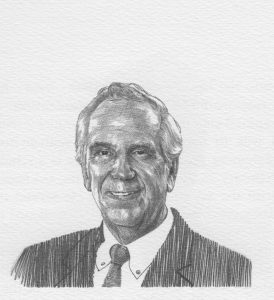Ehney Camp graduated from The University of Alabama in 1928 with a perfect grade point average.
He was just as successful in every other area of his life.
Ehney Addison Camp, Jr., was born May 9, 1907, in Maylene, Alabama, the son of William Wheeler Camp and Pearl Eugenia Hendrick. His father would pass on early in the boy’s life, and his mother would remarry, giving Ehney as a stepfather William Levert Christian. After graduating from Shelby County High School in Columbiana, Alabama, young Camp would head to Tuscaloosa, Alabama, where he would begin an incredible career of academic and civic success.
He was a member of the elite academic and social honoraries – Phi Beta Kappa, Omicron Delta Kappa, Beta Gamma Sigma, Alpha Kappa Psi, and the Jason’s. He joined Sigma Nu Fraternity, forming bonds that would last a lifetime. When he received a degree from the state university’s school of business, it was accompanied by that college’s Outstanding Student Award. Ehney was also honored with the university’s coveted Algernon Sidney Sullivan Award in recognition of his outstanding scholarship, leadership, and record of service.
The summer prior to his graduation, Ehney worked with the Birmingham firm of Ward, Sterne, and Company, now Sterne, Agee, and Leach. After his summa cum laude commencement, he obtained permanent employment with the group, and in his own words (from a History of the Investment Division of Liberty National Life Insurance Company, written in April 1973), “had an opportunity to learn something about bonds and stocks.” After a year he received an offer to open in Tuscaloosa a branch office of Bankers Mortgage Bond Company. Almost immediately after his relocation, the stock market crash of October 1929 occurred, and the company decided to assign him the task of managing the tremendous number of foreclosures and foreclosed properties that were resulting because of the flattened economy. Again, from his History: “Liberty National had previously acquired some mortgages from Bankers Mortgage Bond Company, which the latter firm was servicing for Liberty National. When Bankers Mortgage Company finally went into receivership, it became necessary for Liberty National to take over these mortgages and handle them directly. Because Liberty National had no one with the time or experience to handle these details, I was ‘thrown in’ with the deal and began employment with the company on March 21, 1932.”
And thus began the second chapter of incredible success for Ehney Camp, Jr., this one writ on his professional success.
In his career with Liberty National, which would later become a part of Torchmark Corporation, Ehney would rise through the ranks from his initial position as the first investment employee to become company treasurer in 1935, then a member of the board of directors in 1940. Three years later he was named vice president, and in 1960 was made executive vice president. After his death on January 20, 1993, Torchmark representatives called Ehney Camp “one of the key contributors to the growth and success of Liberty National Life. He was the company’s first chief investment officer … Under his direction, the company’s investments grew from some $2 million to $1 billion.” In 1984 he was named to the Torchmark Gallery of Leaders.
But Ehney was not focused only on helping his company become an insurance giant. He had a personal life, as well, and bits of that found their way into History. “I had been given the responsibility of personally preparing the annual statement,” he wrote. “My problem was to meet the deadline in getting the statement prepared prior to my marriage on February 25, 1933 … Also, since I was taking on the additional responsibilities of marriage, I apparently believed it important to render an annual report to the board … This report showed I had saved the company $1,933 whereas the company had paid my salary of only about $1,600 during the nine and one-third months I had been employed. If I had known that all the banks of the country would close their doors on March 4, 1933, only seven days after my marriage, my report probably would have been directed even more strongly toward the need the company had for my services.”
Ehney Camp married Miss Mildred Fletcher Tillman, and the two had three children, daughters Patricia Alice Camp Faulkner and Mary Eugenia Camp Boulware, and son Ehney Addison Camp III. At the time of his death the elder Camp had eight grandchildren and seven great-grandchildren, now numbering fourteen with one on the way. “The happiness of his family was the most important thing in his life,” said daughter Patricia. “The exemplary values he set for himself have been handed down to all of us.”
As his family grew, so did Ehney Camp’s civic and charitable commitments. In 1953, President Dwight D. Eisenhower appointed him to his Special Advisory Committee on Government Housing Policies and Programs. And the bonds with his fraternity and alma mater grew stronger with the passing years – he served as an advisor, then as a director of the Theta House Corporation, and as a member of the Sigma Nu Educational Foundation. In 1981 the chapter awarded him its Distinguished Alumni Award. A former president of the University of Alabama National Alumni Association, he was chosen as the 1973 Outstanding Alumnus by the Jefferson County Chapter of the Association, and in 1985 was honored by the national organization with its Distinguished Alumnus Award. The university presented him with an honorary Doctor of Laws in 1979; there is a scholarship awarded in his honor by the UA business school.
He served on The University of Alabama System Board of Trustees from 1959 to 1979, and in that capacity was instrumental in planning the growth of the University of Alabama at Birmingham. He was also a member of the committee organized by the city of Birmingham in the mid-1960s to expand the medical center, and in that capacity provided critical assistance in acquiring the land occupied by the urban university. Camp Hall, an eleven-story residence hall on the UAB campus, is named in his honor.
A former president of First National Bank of Columbiana, Ehney Camp was a former president of the Mortgage Bankers Association of Birmingham. He was treasurer and member of the executive committee of Brown-Service Funeral Homes Company, chairman of the board of trustees of First United Methodist Church of Birmingham, past president of the Birmingham Kiwanis Club, and a life member of Kiwanis International. He was a member of the Newcomen Society of North America, a board member of Acipco, served as United Way campaign chairman, and was affiliated with dozens of other civic and professional organizations. He was inducted into the Alabama Academy of Honor in 1976.
Ehney Addison Camp, Jr., was a man committed to his family and friends, his faith and community, and his alma mater. And he was committed to his profession, as his own words show so clearly.
“Because life insurance contracts span several generations, the company is more than just a business. It is an institution, with tremendous obligations and responsibilities to literally thousands of families. Those who are charged with investing its assets must constantly keep before them the nature and full meaning of this trust.”
Ehney Camp was worthy of that trust.

